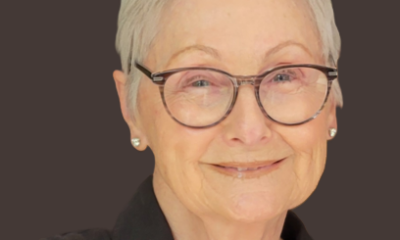Uncategorized
News from Syria shouldn’t distract from what’s been going on in Gaza

By BERNIE BELLAN Amidst the head-spinning news coming out of Syria this past week, it’s easy to forget that there is still a war going on in Gaza. What, exactly, Israel’s government is trying to accomplish there now is not easy to figure out.
The Israel Defense Forces would seem to have achieved all their military goals, including completely nullifying Hamas and Islamic Jihad as threats to Israel, so what more does the Israeli government (and here, I want to clearly differentiate between the goals of the government and the goals of the IDF) hope to accomplish?
In asking that, I want to reflect on two recent articles that appeared in Haaretz. One was about a Hebrew University professor by the name of Lee Mordechai, who has been carefully cataloguing war crimes that the IDF has been committing in Gaza.
Here is the introduction to that Haaretz article: “A woman with a child is shot while waving a white flag ■ Starving girls are crushed to death in line for bread ■ A cuffed 62-year-old man is run over, evidently by a tank ■ An aerial strike targets people trying to help a wounded boy ■ A database of thousands of videos, photos, testimonies, reports and investigations documents the horrors committed by Israel in Gaza”
The article goes on to note that “The report Dr. Mordechai has compiled online – “Bearing Witness to the Israel-Gaza War” – constitutes the most methodical and detailed documentation in Hebrew (there is also an English translation) of the war crimes that Israel is perpetrating in Gaza. It is a shocking indictment comprised of thousands of entries relating to the war, to the actions of the government, the media, the Israel Defense Forces and Israeli society in general.”
In talking with many people about what’s been going on in Gaza over the past year and a half, the reaction I often receive when I suggest that Israel achieved all its military goals very early on in this war is: “Good, let them keep on hitting them so that they’ll never pose a threat to Israelis again.”
That’s understandable, but the dehumanization of the Palestinians in Gaza is something that many of us find detestable. If Israeli soldiers have lowered themselves to the same level of brutality as their enemies, is that anything to be proud of?
As for the rationalizations that by now we’ve become so accustomed to hearing – that you have to fight dirty when you’re fighting terrorists or that the IDF maintains the highest principles of conduct – notwithstanding any evidence to the contrary, simply don’t excuse the kinds of behaviour that Dr. Mordechai describes in graphic detail in his report.
As if that weren’t enough to lead one to doubt Israel’s ongoing campaign in Gaza – which is being pushed forward by the right wing forces who are calling the shots within the Likud-led government of Israel, there was yet another thorough indictment of Israel’s strategy offered up recently, this time by former Defense Minister and Army Chief of Staff Moshe Ayalon, who accused the IDF of engaging in “ethnic cleansing” in northern Gaza.
In an interview with Channel 12 news in Israel, Ayalon maintained that “The IDF is not the most moral army in the world.”
Later in that same interview, Ayalon offered two clarifications of what he meant by using the term “ethnic cleansing.” According to a report, also in Haaretz, Ayalon explained that “First, his definition of ethnic cleansing did not include genocide, but rather ‘evacuating civilians from their homes and demolishing those homes, as is happening in Beit Hanoun and Beit Lahiya.’ He also said that he does not hold the military responsible for these crimes but rather the government, in particular far-right lawmakers like National Security Minister Itamar Ben-Gvir and Finance Minister Betzalel Smotritch, who have repeatedly declared their intentions to build Jewish settlements in Gaza.”
I would venture to say that, if you didn’t know who it was that offered that assessment of what Israel has been doing in Gaza, you would likely think that it came from one of the usual suspects, such as UN Secretary-General António Guterres. The fact that it came from a former Israeli defense minister, also a former IDF chief of staff, not to mention a member of the Likud Party, should lend it some credibility.
But, in the black and white worldview that permeates so many individuals’ thinking when it comes to what Israel has been doing in Gaza, Ayalon would no doubt simply fall into the category of naive critics of Israeli policy according to so many defenders of Israeli government policy.
It’s hard to know where readers of this publication stand, however, on what Israel has been doing in Gaza. There have been almost no letters to the editor commenting on this particular issue – not that letters to the editor offer a true picture of people’s thinking. Further, I don’t make it a habit of engaging everyone I meet in a conversation centering on Israel’s strategic goals in Gaza. Frankly, as is with the case involving a discussion of Donald Trump, tempers can flare easily – and trying to engage in a relatively dispassionate conversation about either Gaza or Trump isn’t easy.
But, a recent survey conducted by three different Canadian Jewish groups shows how diverse opinions are among Canadian Jews are when it comes to Israel.
The survey was conducted by marketing firm Leger and was sponsored by the New Israel Fund, JSpaceCanada and Canadian Friends of Peace Now.
Here are some of the findings from that survey:
• While 84% of Canada’s Jews say they are “very” or “somewhat” emotionally attached to Israel and 94% percent support the existence of Israel as a Jewish state, just 51% of Canadian Jews consider themselves Zionists.
• The poll also found that 34% of Canadian Jews believe the continued building of Jewish settlements in the occupied West Bank hurts Israel’s security, with only 27% saying they believe it helps Israel’s security. The remainder of those polled either said it made no difference or they didn’t know.
• Most Canadian Jews still believe that the ideal outcome to the Israeli-Palestinian conflict is a two-state solution – a Jewish state of Israel alongside an Arab state of Palestine, with 61% support amongst Canadian Jews with an opinion on the subject. 55% of Canadian Jews agree that Canadian politicians should increase pressure on Israeli and Palestinian leaders to engage in a meaningful peace process.
• Canadian Jews are also more likely to indicate their intention to vote for the federal Conservative party if the election were to be held tomorrow, with 55% indicating support for the Conservatives, and 26% for the Liberals. These trends are similar to those in the general population, but the decline in Liberal support and increase in Conservative support is more pronounced among Jews.
I would suggest that the majority of Canadian Jews don’t pay much attention to what Jewish federations do – and here it’s important to note that determining who is Jewish is not easy – as I showed repeatedly ever since the results of the 2020 census came out. (For instance, I was able to establish that only 6700 Winnipeggers identified as Jewish both in terms of their religion and ethnicity in that census.)
The groups that conducted this most recent survey of Canadian Jews’ attitudes would likely not be considered mainstream Jewish organizations in the sense that they do not follow along with what our Jewish federations and CIJA would suggest is the nominal position of most Canadian Jews on Israel. All three are highly critical of Israeli government policies and all three strive to promote peaceful co-existence among Israeli Jews and Palestinians.
Yet, by referring to the work done by Prof. Mordecai documenting Israeli war crimes in Gaza, the assessment that Moshe Ayalon offered that what Israel has been doing lately in Gaza amounts to “ethnic cleansing,” and the recent survey of Canadian Jews’ attitudes towards Israel, I wanted to show how thoughtful Jews – whether they’re in Israel or in Canada, can hold highly divergent opinions from what you are likely to read in most Jewish media (including The Jewish Post). If nothing else, if I can get some readers to consider different viewpoints when it comes to thinking about Israel, I will have accomplished something.
Uncategorized
Why the Super Bowl antisemitism ad uses a familiar slur
To the editors:
The sticky note cruelly slapped on a high school student’s backpack didn’t have to say “Dirty Jew.”
It could have been any one of dozens of other antisemitic slurs, and believe me, throughout my life and current line of work, I’ve seen and heard them all. At the Blue Square Alliance Against Hate, our Command Center closely tracks the spread of antisemitism online, in all its pernicious forms.
In his piece for the Forward about our new Super Bowl ad, PJ Grisar argues that the ad misses the mark by using “Dirty Jew,” characterizing it as old-fashioned and out of touch with the heavily coded, meme-driven ways students typically express antisemitism today.
We’ve seen all of those slurs gaining traction among younger people that Grisar gave as examples of how kids hate today.
But we didn’t pull “Dirty Jew” out of the history books. In creating the ad, the Blue Square Alliance made a conscious decision to follow the research. Our decisions are based on data, from the one billion social media posts we analyze daily, to our semi-annual 7,000-participant survey on American sentiment toward Jews and antisemitism, to our multi-stage audience testing that is foundational to our creative development.
Here’s the hard data: With nearly 500 million social media impressions since 2023, “Dirty Jew” is a slur that has managed to penetrate all corners of American discourse. Worse yet, its usage online has increased by 174% in the past three years, growing at a significantly higher rate than other slurs. And sadly, the last few years have seen more than a few disturbing and real incidents of the scenario in the ad play out in real life. In U.S. high schools. Right now. Not 1950.
This data-guided approach drove our selection of “Dirty Jew” among all the possible antisemitic slurs as the one to appear on the sticky note. Even though at first glance this phraseology may seem dated, it’s actually timeless and ubiquitous — scarily — and is even outpacing other slurs in frequency of use.
So, whether you’re a Boomer, Millennial or Gen Z, there’s no subtlety to what this ad is showing you: this is antisemitism, pure and simple. And, as Grisar acknowledges in his piece, the challenge of storytelling within a 30-second ad window requires a clear, unambiguous message. In that short time, clarity beats complexity.
It was also important to us to use the high school setting and focus our ad on a younger demographic because that is where we have seen the most concerning trends in antisemitism data. Our most recent survey data shows that Gen Z is three times more likely to witness antisemitism than older generations, and yet nearly twice as likely to say it is not a problem.
At the heart of this campaign is Blue Square Alliance’s dedication to addressing another data point: more than 100 million Americans say they are unengaged in the collective effort to stand up against anti-Jewish hate. We have spent the past few years closely studying this segment, and our surveys show that unengaged Americans often don’t know Jewish Americans, they aren’t familiar with antisemitism (their news feeds and social feeds don’t share the awful stories that we all know too well), and they don’t think antisemitism is a significant problem. Importantly, they don’t feel personal or societal pressure to be an ally.
That’s exactly why we’re using the Super Bowl — a cultural touchstone for the entire country — to raise awareness and model allyship. We test all of our ads, including “Sticky Note” and our earlier ads like “Tony,” specifically with this target audience. What we’re seeing is promising.
Among the unengaged, exposure to our messaging measurably shifts attitudes: viewers become 36% more familiar with recent antisemitic incidents and 41% more likely to see antisemitism as a major problem in the United States. And the impact doesn’t stop at awareness — it moves people to act. After seeing our ads, unengaged viewers are 27% more likely to say they would speak up when they witness antisemitism.
And our work to cultivate allies extends far beyond the television screen. We complement our social media, outdoor and audio campaigns with on-the-ground bridge-building to strengthen connections with Americans across communities and reach those who have not yet been meaningfully involved in this issue. Over the past year, we’ve expanded our programs to bring more people into the conversation, like our partnership with UNCF and Hillel International, now on a 14-stop “Unity Dinner” tour, to connect Black and Jewish students on campuses nationwide. And last fall, we joined with the Appeal of Conscience Foundation to launch “Stand Up Sunday,” an interfaith effort that mobilized hundreds of thousands of congregants across the nation to reject antisemitism and all faith-based hate.
Our founder, Robert Kraft, created the Blue Square Alliance Against Hate in 2019 because he recognized that reversing the rise in antisemitism would require both awareness and empathy.
With “Sticky Note,” we’re showing what it means to be an upstander and giving Americans a clear, accessible way to step off the sidelines. We won’t simply win over the unengaged through displays of toughness and bravado alone, as some people have suggested. To reach the unengaged majority, you have to meet them where they are — not where we, as a deeply committed Jewish community, already stand.
The post Why the Super Bowl antisemitism ad uses a familiar slur appeared first on The Forward.
Uncategorized
Amid Iran Standoff, Witkoff and Kushner Pose Aboard USS Abraham Lincoln Aircraft Carrier

Steve Witkoff (R) aboard the aircraft carrier Lincoln. Photo via i24 / social media used in accordance with Clause 27a of the Copyright Law
i24 News – Special US envoys Steve Witkoff and Jared Kushner visited on Saturday the USS Abraham Lincoln aircraft carrier.
The duo, who led the US in the indirect nuclear talks with Iran on Friday, visited the aircraft carrier at the invitation of US Central Command chief, Adm. Brad Cooper.
The carrier arrived in the region last week as part of a US “armada” amid rising tensions with the Islamic regime of Iran. It is stationed in the Arabian Sea.
The visit came hours after US President Donald Trump stated that while the talks went well, “But I think Iran looks like they want to make a deal very badly, as they should. Last time, they decided maybe not to do it, but I think they probably feel differently. We’ll see what the deal is. It’ll be different than last time. And we have a big armada. We have a big fleet heading in that direction. It’ll be there pretty soon. So we’ll see how that works out.”
Uncategorized
Pentagon Says It Will Cut Academic Ties With Harvard University

U.S. Defense Secretary Pete Hegseth arrives to administer the oath to U.S. Army National Guard soldiers during a re-enlistment ceremony at the base of the Washington Monument in Washington, D.C., U.S., February 6, 2026. REUTERS/Jonathan Ernst
Pentagon chief Pete Hegseth said on Friday his department was ending professional military education, fellowships, and certificate programs with Harvard University, marking the Trump administration’s latest escalation against the school.
President Donald Trump’s administration has cracked down on top US universities, including Harvard, over a range of issues such as pro-Palestinian protests against US ally Israel’s assault on Gaza, diversity programs, transgender policies and climate initiatives.
“Starting now and beginning in the 2026-27 school year, I am discontinuing all graduate level Professional Military Education (PME), all fellowships and certificate programs between Harvard University and the War Department for active duty service members,” Hegseth, who himself holds a master’s degree in public policy from the Harvard Kennedy School, said on X.
The policy will apply to service members enrolling in future programs while those currently enrolled will be allowed to finish their courses, Hegseth said.
He also added that the Pentagon will evaluate similar relationships with other universities in the coming weeks.
Rights advocates have raised free speech, academic freedom and due process concerns over the government’s actions against universities.
A Harvard spokesperson directed Reuters to a page on the history of the university’s ties with the US military that says Harvard has played a “significant role” in America’s military traditions since the nation’s founding.
TRUMP-HARVARD TENSIONS CONTINUE
The university has previously sued the Trump administration over the government’s attempt to freeze federal funding.
Hegseth accused Harvard of “hate America activism,” also calling the university antisemitic in a reference to pro-Palestinian protests.
Protesters, including some Jewish groups, say the government wrongly equates criticism of Israel’s assault on Gaza with antisemitism and advocacy for Palestinian rights with support for extremism.
Harvard has condemned discrimination on campus. Its antisemitism and Islamophobia task forces found last year that Jews and Muslims faced bigotry after the start of Israel’s war in Gaza following an October 2023 Hamas attack.
Trump’s attempts to freeze federal funds for Harvard have faced legal resistance and the two sides have failed to reach a deal thus far.
Trump said this week his administration was seeking $1 billion from Harvard to settle probes into school policies.
Some Ivy League schools have reached agreements with the Trump administration and accepted certain government demands. Columbia University has agreed to pay more than $220 million to the government while Brown University has agreed to pay $50 million to support local workforce development.








